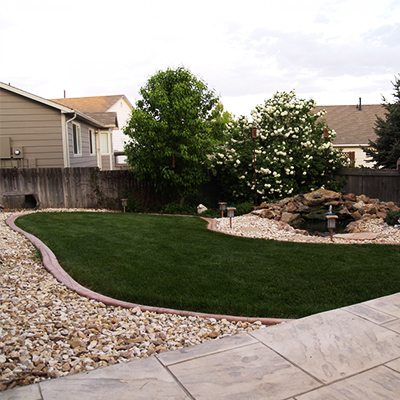YOUR TOP RATED LOCAL® SPOKANE LAWN CARE COMPANY
At Impeccable Landscapes in Spokane, we take immense pride in providing our customers with quality lawn care services at a fair price. Our family-owned and -operated business focuses on creating a personalized experience for each customer. Whether you are in need of full-service landscape maintenance or would like us to prepare your lawn for winter, handle snow removal, or take care of the weekly mowing, we can handle it all. At Impeccable Landscapes, we are here to provide you with the exact services you need and to exceed your expectations every time. Contact our team of Spokane lawn care experts today to learn more.

WHY CHOOSE IMPECCABLE LANDSCAPES FOR SPOKANE LAWN CARE?
- We are dedicated to providing a superior customer experience
- We are locally owned and family-operated
- We offer both residential and commercial lawn care services
- We offer a wide variety of services from snow removal and fall clean up to lawn fertilization and weekly mowing
- We have been serving Spokane and the surrounding areas since 1995
- We are fully licensed, bonded, and insured

SERVING SPOKANE SINCE 1995

Fully Licensed, Bonded, and Insured

Wide Variety of Lawn Care Services

Locally Operated and Family-Owned
SPOKANE LAWN CARE FAQS
Is hiring a professional lawn care company worth it?
At Impeccable Landscapes, we believe that hiring a professional lawn care company is completely worth the investment. Especially, if you want to keep your yard healthy and green all season long and don’t have either the time or expertise needed to do it yourself. With professional lawn care, you have the advantage of enjoying your yard with family and friends during your free time rather than spending your weekends mowing the lawn and pulling weeds. In addition to having the ability to spend your free time how you see fit, you can always be sure that your yard is going to be taken care of properly. Whether you’re concerned about how much to water your lawn, how often it should be mowed, or when your shrubs should be pruned, a professional lawn care company can handle all of this the right way, so you can sit back, relax, and enjoy your beautiful-looking yard.
How much do lawn care services cost?
This question doesn’t really have a one-size-fits-all answer. The pricing of lawn care services depends on the services you need and the size of your yard, as well as other factors. For example, a small yard that needs to be mowed once a week wouldn’t be at the same price point as a large yard with multiple trees and shrubs to be pruned. At Impeccable Landscapes, we can provide you with a free estimate to give you an accurate view of how much your lawn care services will cost.
How often does my lawn need to be mowed?
This is a common question that we hear a lot at Impeccable Landscapes. During the summer months, we recommend mowing your lawn once a week. When the weather cools during the fall, you can usually begin mowing once every two weeks.
FALL SERVICES SEASONAL LAWN CARE FAQS
When should I fertilize my lawn?
We recommend fertilizing your lawn at least twice a year. Your lawn should be fertilized during the fall before the first freeze to prepare it for the winter. This will help your lawn grow back greener when the snow melts and the air starts to warm again. We also recommend fertilizing your lawn in the spring. This is essential if you want your lawn to grow back green and lush after being subjected to snow and freezing temperature all winter long.
How do I prepare my lawn for the winter?
There are several steps you will want to take to ensure that your lawn is ready to survive the winter season. First, you’ll want to continue to water and mow your lawn throughout the fall. This is usually the time of year when homeowners can become lax on this sort of upkeep, but it will greatly increase the chance of your lawn growing back quickly come spring. Also, you’ll want to ensure that you remove any fallen leaves from your lawn as leaves create a warm environment conducive to mold and mildew growth. Additionally, you’ll want to aerate and fertilize your lawn before the first freeze, as well as have a sprinkler system blow-out performed. The aeration allows the fertilizer to get deep down in the roots of the grass making it strong enough to withstand the winter season, while the sprinkler system blow-out ensures there is no water left in the system to freeze and damage it.
How do I aerate my lawn?
In order to properly aerate your lawn, you’ll need an aerator. These come in two basic types, a plug aerator, and a spike aerator. They are both pretty self-explanatory to use. However, seeing as you’ll only use this equipment once a year, it may be in your best interest to hire a professional lawn care company to handle the aeration and fertilization during the fall. You’ll also benefit from knowing that it is being done properly so that your grass is ready for a cold, snowy Spokane winter.
Should I remove the leaves from my lawn?
At Impeccable Landscapes, we hear this question quite often. The answer is yes. If fallen leaves are left on your lawn, they can cause a number of problems including the growth of mold and mildew. The leaves can also make a nice, comfortable home for pests. Additionally, if the leaves are left on your lawn during the winter, the snow will pack them down making them more difficult to remove and smother your grass, making it more difficult to revive in the spring.
IMPECCABLE LANDSCAPES FAQS
Does Impeccable Landscapes offer lawn care services in my area?
Impeccable Landscapes is located in Spokane and offers lawn care services throughout Washington, Northern Idaho, and Montana. If you live within this area, there is a great chance that we provide services to your area. If you’re unsure, you can give us a call and we’d be happy to check if you are in our service area.
Are you licensed, insured, and bonded?
Yes! At Impeccable Landscapes, we are fully licensed, bonded, and insured. We take immense pride in the quality of the services that we provide and we always put the safety of our customers and employees at the forefront. When you work with our Spokane lawn care company, you can rest assured that we have already handled all of the legalities so that we can focus on providing you with the superior lawn care services that you have come to rely on.
Do you offer residential and commercial lawn care services?
Yes! At Impeccable Landscapes, we offer all of our lawn care and landscape maintenance services to both residential and commercial clients. So, whether you need the lawn at your home mowed once a week or the shrubs at your business pruned, we can take care of it all.
Can I get full-service lawn care and landscape maintenance services?
Yes! At Impeccable Landscapes, we offer our services ala carte as well as a full-service option. This is especially convenient for business owners who want to focus their attention on running their company rather than their lawn, as well as homeowners who have a busy schedule. Contact our team today and we’ll give you a free estimate on full-service lawn care and landscape maintenance services for your property.
Spokane Lawn Care FAQs
Impeccable Landscapes – Your Spokane Lawn Care Experts
If you are searching for quality lawn care and landscape maintenance services, look no further than Impeccable Landscapes. Our family-owned and -operated company can provide you with all of the services you need from weekly mowing and shrub care to snow removal and sprinkler system blow-outs. And, when you work with our lawn care experts, you can rest assured that the job will get done right and on time. Give us a call today and we’ll provide you with a free estimate.

